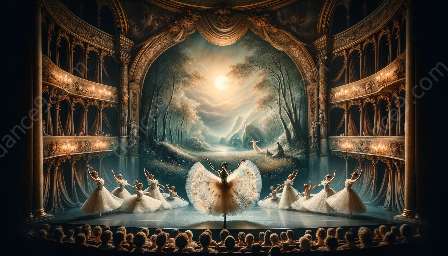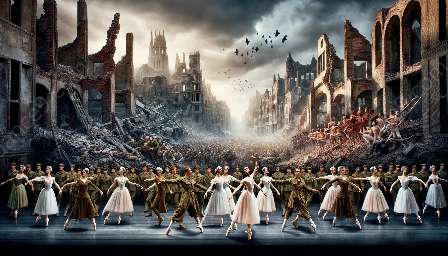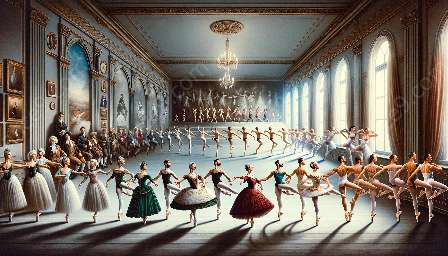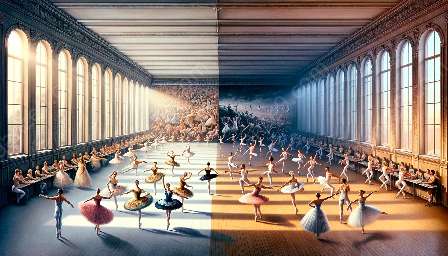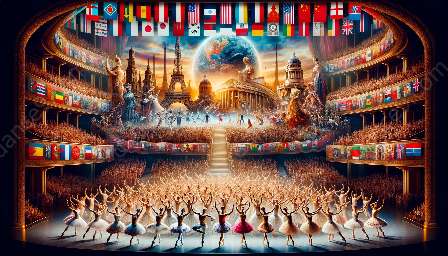Ballet is a fine art that has been influenced by music for centuries. The relationship between music and ballet is crucial to the appreciation and understanding of this art form. When it comes to altering or reimagining the original musical score of a ballet production, ethical considerations come into play. This delicate topic requires an in-depth exploration, especially in the context of ballet history and theory.
The Influence of Music on Ballet
The influence of music on ballet cannot be overstated. From the early days of ballet, music has been an essential component in shaping the emotional and aesthetic experience of the audience. Composers such as Tchaikovsky and Stravinsky have created iconic scores that are inseparable from the ballets they accompany, such as 'The Nutcracker' and 'The Rite of Spring.'
Music sets the tone, pace, and emotional depth of a ballet production. It serves as the foundation upon which choreography, storytelling, and overall performance are built. Without the right musical accompaniment, the impact of ballet can be significantly diminished.
Ballet History and Theory
To understand the ethical considerations of altering a ballet's musical score, it's important to delve into the historical and theoretical aspects of ballet. Ballet has evolved over centuries, intertwining with various cultural and artistic movements. Its stylistic and narrative elements have been shaped by historical contexts, from the grandeur of classical ballet to the innovation of contemporary choreography.
Ballet theory encompasses the principles of movement, aesthetics, and storytelling within the art form. These theoretical foundations guide the creative decisions made in ballet productions, including the selection and adaptation of musical scores. The preservation of ballet's historical integrity and the respect for the intentions of its creators are integral to the ethical framework of ballet production.
Ethical Considerations in Altering Musical Scores
When contemplating alterations to the original musical score of a ballet production, ethical considerations arise on multiple fronts. The following factors must be carefully weighed:
- Artistic Integrity: The original musical score is often an integral part of a ballet's identity. Altering it can raise questions about preserving the artistic integrity of the work. Ballet composers carefully craft their scores to align with the choreography and thematic elements. Significant alterations may disrupt this delicate balance and hinder the intended artistic expression.
- Historical Context: Ballet productions are often tied to specific historical periods or cultural narratives. The original musical score reflects these contexts and contributes to the authenticity of the production. Altering the score without regard for its historical significance may compromise the authenticity and historical accuracy of the ballet.
- Composer's Intentions: Respecting the intentions of the original composer is vital in any musical adaptation. The composer's creative vision, musical motifs, and thematic nuances are intricately woven into the score. Reimagining the score without consideration for the composer's intentions may result in a departure from the original artistic vision.
- Impact on Choreography: Ballet choreography is intricately intertwined with the musical score, shaping the movements and emotions of the dancers. Any alterations to the score can have a profound impact on the choreographic structure, potentially requiring significant adjustments and adaptations by the choreographer and dancers.
- Collaborative Consent: In cases where a new musical score is proposed for an existing ballet, collaborative consent from choreographers, dancers, musical directors, and artistic directors is crucial. Transparency and open dialogue among all parties involved in the production can help navigate the ethical considerations and ensure that the alterations serve the artistic vision while respecting the original work.
Conclusion
Exploring the ethical considerations in altering or reimagining the original musical score of a ballet production is an essential aspect of ensuring the preservation and evolution of this art form. The influence of music on ballet, coupled with the rich history and theoretical underpinnings of ballet, requires a thoughtful and conscientious approach when contemplating changes to musical scores. By honoring the ethical considerations and engaging in collaborative dialogue, the seamless integration of music and ballet can continue to captivate audiences while respecting the integrity of the original works.






